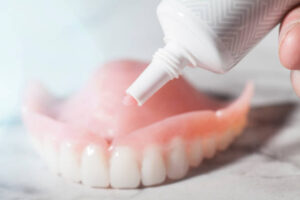 New materials and technologies allow dentures to fit better than ever before. A good-fitting set of dentures should rest comfortably on your gums, only relying on suction to stay in place. However, if you have an upcoming speaking engagement or you plan to eat a juicy steak, a denture adhesive can provide more stability to prevent your teeth from moving around. Although it isn’t something you want to rely on, here’s how to use a denture adhesive when you need it.
New materials and technologies allow dentures to fit better than ever before. A good-fitting set of dentures should rest comfortably on your gums, only relying on suction to stay in place. However, if you have an upcoming speaking engagement or you plan to eat a juicy steak, a denture adhesive can provide more stability to prevent your teeth from moving around. Although it isn’t something you want to rely on, here’s how to use a denture adhesive when you need it.
Choosing a Denture Adhesive
There are many types of denture adhesives, so it may take some trial and error to find the best one for your needs and preferences. Adhesives are available in pastes, powders, wafers, and strips. Pastes are the most popular because they are easy to use and clean off well.
The adhesive you choose should create a seal. You may need to experiment with the amount used to create a snug fit. This will ensure food doesn’t get trapped between the prosthetics and your gums, which can cause discomfort.
No matter the type you choose, avoid those containing zinc. Overusing adhesives with zinc can lead to medical problems.
Tips for Using Denture Adhesives
After selecting an adhesive, clean your dentures well using a soft-bristled toothbrush and a mild hand soap or dishwashing liquid. Apply the adhesive to your dentures and position them in place. Hold them in position for a few seconds.
Who Can Benefit from a Denture Adhesive?
A denture adhesive can boost your confidence by giving your chompers added strength for a stronger biting force and better comfort. It can also help patients with dry mouths caused by medication use. People who put a lot of strain on their faces can benefit from an adhesion, like teachers, singers, and public speakers.
Denture adhesives aren’t recommended for people with poor oral hygiene habits or who experience allergic reactions to the material. An adhesive is not meant to be used long-term. If your dentures aren’t fitting correctly, it’s important to schedule an appointment with your dentist.
Poor-fitting dentures can affect your oral health and general wellness. Not to mention, it can weaken your prosthetic over time. Your dentist can reline your dentures to restore a comfortable fit.
Invest in Unmatched Stability
If you’re ready to stop slipping and irritation for good, you might be a candidate for dental implants. Your dentist can place implant posts in your jaw to serve as new tooth roots to support your denture. You’ll benefit from the next best thing to real teeth, so you’ll never have to worry about your dentures moving around.
About Dr. Karen Littlefield Neil
Dr. Neil achieved her dental degree at the University of Texas Health and Science Center and has regularly continued her training in many specialties, like dental implants and cosmetic dentistry. She holds affiliations with the Texas Dental Association and the Fort Worth District Dental Society. Request an appointment through her website or call (817) 663-1588.
